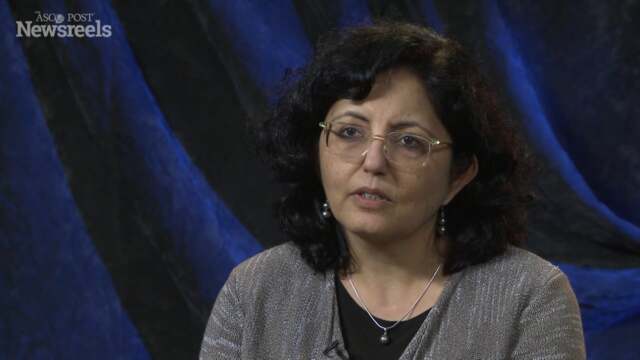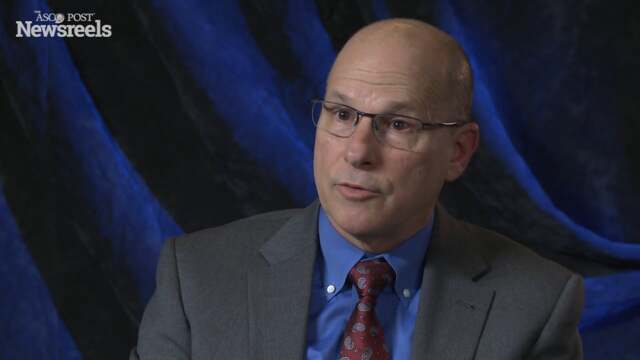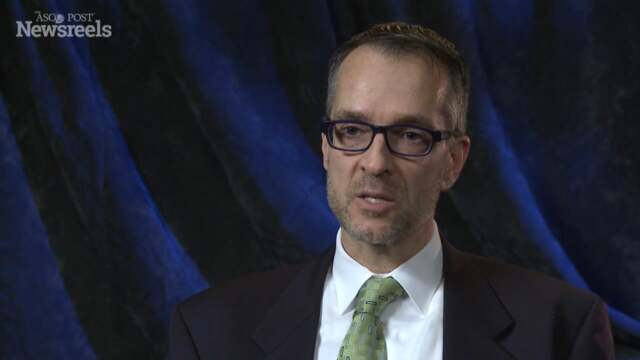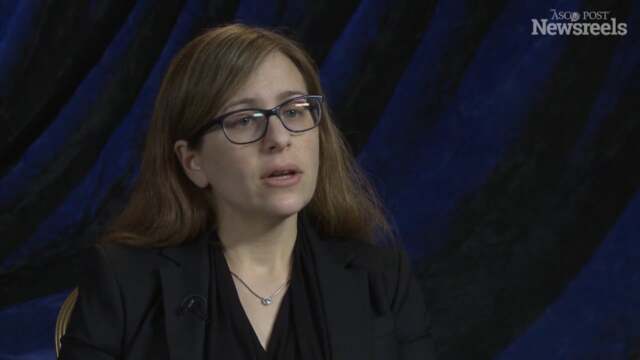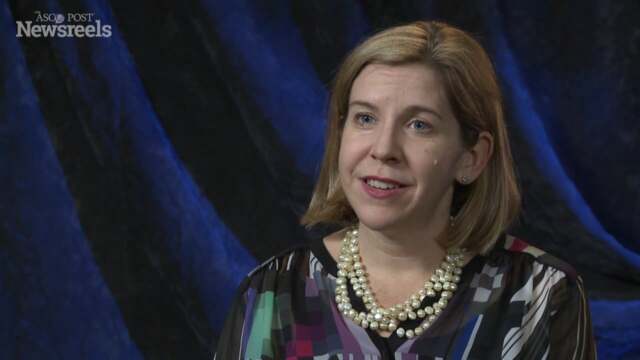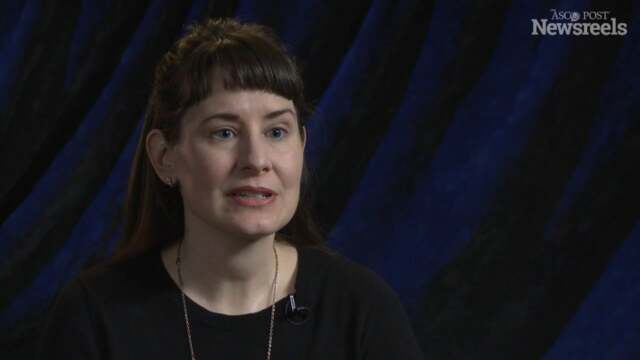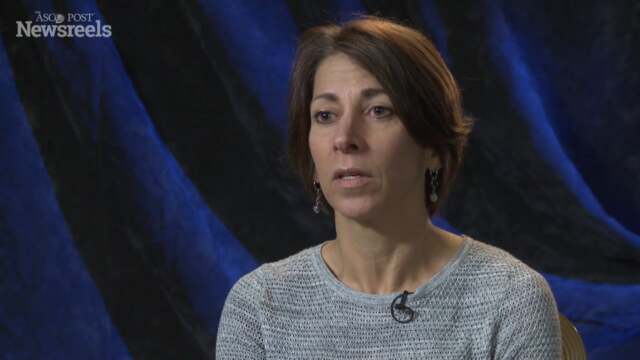Smita Bhatia, MD, MPH, on the Science of Survivorship
Smita Bhatia, MD, MPH, of the University of Alabama at Birmingham, discusses long-term and late effects experienced by cancer survivors.
Kevin C. Oeffinger, MD, on Highlights of the ASCO Survivorship Symposium
Kevin C. Oeffinger, MD, of Memorial Sloan Kettering Cancer Center, summarizes the main take-home messages of the conference.
Christopher J. Recklitis, PhD, MPH, on Fatigue and Sleep Disturbances
Christopher J. Recklitis, PhD, MPH, of Dana-Farber Cancer Institute, discusses these side effects and some practical approaches to managing them with educational, medical, behavioral, and lifestyle interventions.
Dana Barnea, MD, on Screening Survivors for Thyroid Cancer
Dana Barnea, MD, of Memorial Sloan Kettering Cancer Center, discusses data that suggest annual palpation of the thyroid is an adequate and safe means of screening childhood and young adult cancer survivors, a population at high risk for this type of cancer (Abstract 254).
Mary S. McCabe, RN, on Risk-Based Health Care of Cancer Survivors
Mary McCabe, RN, of Memorial Sloan Kettering Cancer Center, discusses various models of delivering survivorship care.
Tara O. Henderson, MD, MPH, on Cancer Survivors With Complex Medical Needs
Tara O. Henderson, MD, MPH, of the University of Chicago, summarizes a session on the multidisciplinary approaches to survivors with medical needs beyond cancer treatment.
Erin Elizabeth Hahn, PhD, MPH, on Hodgkin Lymphoma: Post-Treatment Services
Erin Elizabeth Hahn, PhD, MPH, of Kaiser Permanente Southern California, discusses the use of recommended post-treatment services for adolescent and young adult Hodgkin lymphoma survivors (Abstract 107).
Rachel Lynn Yung, MD, on Weight-Loss Intervention in Obese Survivors
Rachel Lynn Yung, MD, of the Dana-Farber Cancer Institute, discusses her study of a clinic-based intervention for overweight cancer survivors, which resulted in weight loss and improvements in fitness and physical functioning (Abstract 167).
Kerri M. Winters-Stone, PhD, on Peripheral Neuropathy: High Prevalence Among Female Survivors
Kerri M. Winters-Stone, PhD, of Oregon Health and Science University, discusses the results of her study, which showed that, years after treatment, nearly half of women cancer survivors still have symptoms of chemotherapy-induced peripheral neuropathy. The findings may inform rehabilitative programs to prevent falls and injuries (Abstract 130).
Tim A. Ahles, PhD, on Neurocognitive Late Effects
Tim A. Ahles, PhD, of Memorial Sloan Kettering Cancer Center, discusses “chemobrain” and what can be done to help patients cope with this symptom.
Patricia A. Ganz, MD, on Looking Beyond the Scans: What to Look For and How
Patricia A. Ganz, MD, of the University of California at Los Angeles, discusses the limited sensitivity and specificity of surveillance testing for cancer recurrence and finding a better way to reassure patients about their continuing care.
Computerized Cognitive Training Promising for Reducing Cognitive Late Effects in Childhood Cancer Survivors
In a study reported in the Journal of Clinical Oncology, Heather M. Conklin, PhD, of St. Jude Children’s Research Hospital, and colleagues found that computerized cognitive training showed promise in reducing cognitive late effects in survivors of childhood cancer.1 Study Details In the study,...
Study Shows Inferior Outcomes for African American Pediatric Lymphoma Patients
Researchers from Sylvester Comprehensive Cancer Center at the University of Miami Miller School of Medicine have published a study showing that African American pediatric patients with Hodgkin lymphoma have inferior overall survival compared with their white and Hispanic peers. The study, published ...
Risk Factors for Lymphedema in Patients Treated for Breast Cancer
In a study reported in the Journal of Clinical Oncology, Ferguson et al found that cellulitis in the affected arm, but not blood draws, injections, trauma to the affected arm, or air travel, was associated with an increased risk of lymphedema in women treated for breast cancer. Study Details In...
Survivorship Symposium 2016: ASCO Announces New Award Recognizing Extraordinary Contributions to Cancer Survivorship Care
ASCO has announced the creation of the Ellen L. Stovall Award and Lecture for Advancement of Cancer Survivorship Care, intended to recognize and promote the work of pioneers and leaders in the growing field of survivorship. The first award will be presented at the 2017 Cancer Survivorship...
Survivorship Symposium 2016: Persistent Chemotherapy-Induced Peripheral Neuropathy Is Common in Female Cancer Survivors
A new study of women cancer survivors indicated that 45% still have chemotherapy-induced peripheral neuropathy symptoms years after completing cancer treatment. Chemotherapy-induced peripheral neuropathy was associated with worse physical functioning, poorer mobility, and a nearly twofold higher...
A Conversation with Patricia A. Ganz, MD
Researching the effects of cancer on patients’ quality of life and championing the development and implementation of survivorship care plans have been at the forefront of the 20-year-long career of Patricia A. Ganz, MD, Director of the Division of Prevention and Control Research at UCLA’s Jonsson...
Planning Survivorship Programs: An International Endeavor
The March 11th report by the U.S. Centers for Disease Control and Prevention highlighted once again the growing number of cancer survivors—now approximately 12 million. This good news serves as a reminder to the oncology community of the need for formal care for this increasingly large group of...
A Conversation with Brad Zebrack, PhD, MSW, MPH
Each year in the United States, approximately 70,000 people between the ages of 15 and 40 are diagnosed with cancer. And while getting a cancer diagnosis at any age can be devastating, for adolescents and young adults (AYAs) grappling with sexuality, body image, peer pressure, dating, marriage,...
Experts Seek to Explain the Survival Gap in Adolescents and Young Adults with Cancer
While overall cancer survival rates continue to rise-there are nearly 12 million cancer survivors today, according to the latest figures from NCI-most of that improvement is among pediatric and older adult patients. For adolescent and young adult patients with cancer, defined by the NCI as those in ...
Survivorship Symposium 2016: Study Finds That Less Than Half of Survivors of Hodgkin Lymphoma Received All Recommended Follow-up Care
According to the American Cancer Society’s 2014 Cancer Facts & Figures, Hodgkin lymphoma is diagnosed in about 800 adolescents and young adults each year. And while standard treatments for the cancer, including chemotherapy and radiation, are very effective in improving survival,...
Survivorship Symposium 2016: Study Finds Personalized Survivorship Care Plans Improve Health Outcomes in Low-Income Breast Cancer Survivors
Although the Institute of Medicine recommends the implementation of treatment summaries and survivorship care plans as a mechanism to improve ongoing clinical and coordination of oncology care and to address the immediate post-treatment and long-term effects of cancer therapy, empirical evidence...
Yoga, Geriatric Assessment, and Nausea/Vomiting Addressed in Session on Supportive Care and Survivorship Issues
Marie E. Wood, MD, of the Familial Cancer Program at the University of Vermont, Burlington, addressed clinically relevant issues in supportive care and survivorship at the Best of ASCO® Annual Meeting ‘11 in Miami. Delayed Nausea and Vomiting Two studies addressed the problem of...
Helping Cancer Survivors Return to Work
For many of the 12 million cancer survivors throughout the United States, remaining in the workforce is an important expectation that requires the support and attention of the oncology community. And while continuing employment can be critically important for economic reasons (especially in the...
Significant Neurologic and Executive Function Impairment among Breast Cancer Survivors
Women who survive breast cancer show significant neurologic impairment, with outcomes appearing to be significantly poorer for those treated with chemotherapy, according to a report in the Archives of Neurology. Investigators at Stanford University School of Medicine in California conducted an...
Eating Problems and Pain Prevalent in Survivors of Head/Neck Cancer
“Eating problems due to poor oropharyngeal functioning and persistent pain are the most prevalent problems” faced by patients 5 years after being treated for head and neck cancer, according to a study published online by the Archives of Otolaryngology–Head & Neck Surgery.1 More than 50% of...
Controlled Study Links ‘Chemobrain’ to Longitudinal Changes in Brain
The phenomenon called “chemobrain”—impaired cognitive functioning following chemotherapy—correlates with longitudinal changes in the brain’s white matter, according a recent study in the Journal of Clinical Oncology.1 Structural changes in the white matter, measured by magnetic resonance diffusion...
Cancer Survivors Stand Up, Give Thanks, and Give Back
“I have me back,” is how breast cancer survivor Jeanette Daniel of Memphis described her life after being treated on a clinical trial at Vanderbilt-Ingram Cancer Center in Nashville. Being conducted by the Stand Up To Cancer P13K Dream Team, whose leader discovered the PI3K pathway, the trial...
Risk Stratification and Targeted Therapy, Abetted by Collaboration, Improve Outcomes for Children with Cancer
Outcomes for children with cancer have “improved over the course of the years incrementally, mostly not from the development of new drugs, because virtually all the drugs that we use now in leukemia were available in the 1970s. It is really through better understanding of the heterogeneity of the...
Better Information Needed for Primary Care Providers Who Treat Cancer Survivors
Many primary care providers are unaware of the late effects of chemotherapy, according to survey results presented at the ASCO Annual Meeting.1 For three out of four commonly used chemotherapy agents, medical oncologists performed well on the survey, but 29% to 38% of medical oncologists were...
ASCO Studies Point to Risks Associated with Treating Childhood Cancers
Risks associated with being a young cancer survivor were emphasized by two studies highlighted in press briefings at the 2012 ASCO Annual Meeting. Investigators from the Children’s Oncology Group (COG) reported that adolescents and young adults treated for high-risk B-precursor acute lymphoblastic ...
Long-term Survivors of Hodgkin Lymphoma May Have Increased Risk of Neurocognitive Impairment
A “new finding” that long-term survivors of childhood Hodgkin lymphoma may be at risk for neurocognitive impairment and central nervous system (CNS) pathology arose from a study among 62 patients treated with either high-dose (≥ 30 Gy) thoracic radiation or lower-dose (< 30 Gy) thoracic...
Prone Position during Radiation Therapy for Breast Cancer Is Associated with Reduced Irradiation to Lung and Heart
Preliminary data on prone positioning during whole-breast radiotherapy following breast-preservation surgery “suggest that radiation exposure to the heart and lung can be reduced compared with supine positioning with similar efficacy,” according to a research letter in the Journal of the American...
Radiation to the Skin and Later Risk of Basal Cell Carcinoma Studied
The likelihood of developing basal cell carcinoma was approximately 40 times higher among participants of the Childhood Cancer Survivor Study (CCSS) who received a dose of 35 Gy or more to the skin from radiation therapy than survivors who were not treated with radiation, according to a study...
New ASCO Statement Outlines Agenda to Advance Cancer Survivorship Care
In response to the needs of a growing population of cancer survivors, ASCO has released a position statement, recently published online in the Journal of Clinical Oncology. Developed through the work of the ASCO Cancer Survivorship Committee, the statement outlines a comprehensive agenda for...
Study Finds Young Cancer Survivors Often Skip Checkups
Athough the majority of the more than 69,000 adolescents and young adults (AYAs) diagnosed with cancer each year will survive their disease, many of them will experience interruptions in their education and a derailment in their career tract, curtailing their lifetime earning potential and reducing ...
Number of Cancer Survivors Expected to Increase to 18 Million by 2022
The American Association for Cancer Research recently released its second Annual Report on Cancer Survivorship in the United States. The report shows that as of January 2012, there were approximately 13.7 million cancer survivors in the United States, a number that is expected to rise by 31% to 18...
Sexual Health after Cancer: Communicating with Your Patients
Studies show virtually all cancer survivors will experience some form of sexual dysfunction following a cancer diagnosis and treatment. Yet few cancer survivors seek help for physical problems they may be experiencing, such as vaginal dryness, dyspareunia, chemically induced menopause, reduced...
Fred Hutchinson Cancer Research Center Survivorship Program to Lead New Study on Cancer In Young Adults
The Fred Hutchinson Cancer Research Center Survivorship Program and its Directors, K. Scott Baker, MD, and Karen Syrjala, PhD, have been selected to lead a nationwide study that aims to improve long-term health outcomes for cancer survivors between the ages of 18 and 39 years. Underway this spring, ...
Dr. Bernard Fisher's Breast Cancer Research Left a Lasting Legacy of Improved Therapeutic Efficacy and Survival
Bernard Fisher, MD, is recognized today for his groundbreaking research in breast cancer, which ultimately ended the standard practice of performing the Halsted radical mastectomy, a treatment that had been in place for more than 75 years. His laboratory and clinical investigations led to more...
Breakthroughs in Targeted Therapies for Breast Cancer Are Improving Patient Survival Rates
For more than 20 years, José Baselga, MD, PhD, has devoted his medical and scientific career to caring for breast cancer patients and the development of novel molecular targeted agents to treat the disease. From 1996 to 2010, he was Head of the Oncology Department of Vall d’Hebron University...
Breast Cancer Survivors Not Likely to Maintain Physical Activity Sufficient for Benefits of Exercise
Few breast cancer survivors meet national exercise recommendations during the 10 years after being diagnosed, even though they are among the women who could most benefit from regular physical activity, according to a study by researchers at Fred Hutchinson Cancer Research Center. Prior studies and...
In Chicago for ASCO?
Robert H. Lurie Comprehensive Cancer Center of Northwestern University is celebrating the 20th Annual Cancer Survivors’ Celebration with a first! Join the Lurie Cancer Center for a timed 5K run along the lakefront on Sunday, June 2. The run will start in Chicago’s Grant Park at 7:15 AM, before the ...
Celebrations Nationwide Recognize Cancer Survivorship in June
Among the celebrations held nationwide recognizing survivorship day in June, there was a special program held on June 10, 2013, at Memorial Sloan-Kettering Cancer Center in New York. Mary McCabe, RN, MS, Director, Survivorship Program, at MSKCC, moderated the program. The evening celebration...
More Than 98% of Childhood Cancer Survivors Have Chronic Health Conditions
More than 98% of adult survivors of childhood cancer in a large clinically evaluated cohort had a chronic health condition, including a substantial number of previously undiagnosed problems that are more likely to occur in an older population. “These findings underscore the importance of ongoing...
I Overcame Cervical Cancer but Not Its Long-term Effects
In 1979, when I was just 35 years old, I started experiencing abnormal vaginal bleeding and lower back pain. When a Pap test came back normal, the gynecologist I saw said not to worry about anything, that I was fine. But I wasn’t fine. My symptoms quickly escalated, and I sought the opinion of...
Living and Working with Cancer
The most recent figures from the National Cancer Institute put the number of cancer survivors in the United States at nearly 14 million—by 2022, that number is expected to top 18 million. And for the vast majority of those survivors—more than 80%—returning to work after treatment is a top priority...
I'm Not the Person I Was Before Cancer
I’ve been the caretaker for my husband Will since he suffered three strokes in March 2011, followed by a diagnosis of leukemia a few months later. Now, our roles have reversed, and Will is taking care of me as I go through treatment for stage III follicular non-Hodgkin lymphoma (NHL). It’s been a...
Fertility Rates in Childhood Cancer Survivors Suggest Strategies for Follow-up Care
Childhood cancer survivors with clinical infertility have a good chance of achieving pregnancy, according to new findings from the Childhood Cancer Survivor Study (CCSS). Study Background As a group, women who survive childhood cancer are known to have lower fertility rates. This study, however,...
Cancer: Survivors in Focus Photo Exhibit Honors Cancer Survivors
In June, the David J. Sencer Centers for Disease Control and Prevention (CDC) Museum in Atlanta, Georgia, opened a new photo exhibit featuring the faces of people living through and beyond a cancer diagnosis. The exhibit: Cancer: Survivors in Focus, tells the stories of cancer survivors while...
